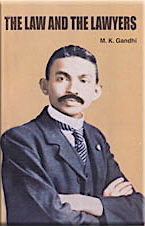Why Lawyers Fear Love: Mohandas Gandhi’s Significance to the Mindfulness in Law Movement
by Nehal A. Patel

Book jacket art courtesy mkgandhi.org
“As regards lawyers, the position is worse still. Have they overcome their infatuation for law-courts? … Have the lawyers realized that justice should not be costly? … Lawyers have not yet overcome the allurement of fat fees and, in consequence, the cost of justice continues to be counted in terms of gold and guineas … justice cannot be sold.” M.K. Gandhi (1)
ABSTRACT: Although mindfulness has gained the attention of the legal community, there are only a handful of scholarly law articles on mindfulness. The literature effectively documents the Mindfulness in Law movement, but there has been minimal effort to situate the movement within the broader history of non-Western ideas in the legal academy and profession. Similarly, there has been little recent scholarship offering a critique of the American legal system through the insights of mindfulness. In this article, I attempt to fill these gaps by situating the Mindfulness in Law movement within the history of modern education’s western-dominated worldview. With this approach, I hope to unearth some of the deep challenges facing a mindful revolution in law that are yet to be widely discussed.
In Part I, I introduce the current mindfulness movement in American society. In Part II, I summarize the current Mindfulness in Law movement and the treatment of “Eastern” thought in modern education. I also describe the three levels of change discussed in academic literature: individual, interpersonal, and structural change. In Part III, I discuss how Mohandas Gandhi exemplifies all three levels of change. In Part IV, I offer critical appreciation of the Mindfulness in Law movement by highlighting Gandhi’s insights on structural reform. I conclude that a mindful application of Gandhi’s thought suggests that satyagraha be incorporated into a constitutional framework, thus making legally protected speech out of forms of public-state dialogue that are traditionally “extra-legal” and used disproportionately by marginalized populations.
Mindfulness seems to be everywhere in American society. The February 3rd, 2014 issue of Time magazine, one of the most widely read periodicals in the United States, showcased a meditating woman on the cover with the title “The Mindful Revolution.” (2) This front-page story contained descriptions of the impact of mindfulness in both the scientific community and in practical application, from managing job stress to reducing anxiety among students. (3) The article described various mindfulness practices, such as chewing meditation and aimless wandering, which many Americans are seeking to manage daily life. (4)
Moreover, United States Congressman Tim Ryan recently wrote a book titled A Mindful Nation, and has made several television appearances to promote mindfulness. (5) After experiencing an extremely fast and stressful life in American politics, Congressman Ryan sought help from mindfulness meditation to handle the strains of his career. In this process, he had a transformative experience that changed his outlook on his life and American society. Congressman Ryan summarized the great potential of mindfulness in his book and detailed his vision of the way mindfulness can transform people’s health, people’s lives, the American educational system, and ultimately American society. (6) In addition, other prominent figures such as American economist Jeffrey Sachs have called for a shift to a “mindful society,” (7) and mindfulness advocates also have applied mindfulness practices in schools and even police departments. (8)
Read the pdf of the complete article here: Why Lawyers Fear Love
EDITOR’S NOTE: Nehal A. Patel is Assistant Professor of Sociology and Criminal Justice, University of Michigan-Dearborn; Ph.D. (Sociology), Northwestern University, 2009; J.D., University of Wisconsin Law School, 2003. To quote from his University of Michigan page, “he has begun a series of undertakings called the Mindful Law Project, which aims to develop social & legal thought through the thought of Gandhi and the insights of meditative & contemplative traditions. His current projects involve applications of Gandhi’s thought to environmental justice and to LGBTQ civil rights.” Please also consult his personal website for other of his writings on Gandhi: sites.google.com/a/umich.edu/nehalp. The article courtesy of British Journal of American Legal Studies, #251, Volume 4, Issue 1, (Spring 2015); www.bcu.ac.uk/law/research/centre-for-american-studies/british-journal-american-legal-studies/current-issue.




